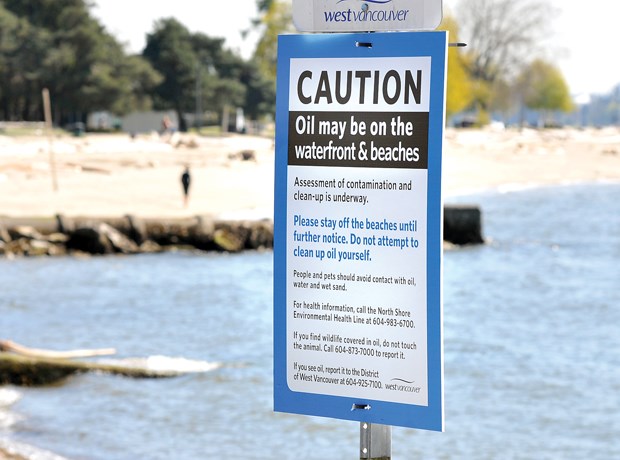Thirteen hours went by between the time a West Vancouver resident reported an oil slick on the water to the Canadian Coast Guard and the time District of West Vancouver staff eventually learned the next morning of the large fuel spill that hit local shores.
That information — along with other miscommunication that delayed the emergency response — has come to light as part of a recently released review into the English Bay oil spill on April 8.
West Vancouver Chief Administrative Officer Nina Leemhuis said the length of time it took for the district to be notified is concerning and highlights a need for improved communications between emergency response agencies and organizations affected by incidents such as an oil spill.
In the aftermath of the spill, West Vancouver Mayor Michael Smith was critical of the Coast Guard for the long delay in notifying municipalities, saying it prevented district staff from mitigating the damage done by the spill.
“Obviously there was a screw up,” said Smith after the April incident.
Miscommunication and uncertainty about roles and responsibilities between the Coast Guard, Port Metro Vancouver and Western Canada Marine
Response Corporation stymied the cleanup effort for nearly two hours after the spill started, according to the review conducted by former Coast Guard assistant commissioner John Butler.
Approximately 2,700 litres of Bunker C fuel oil flowed from the MV Marathassa into the waters around English Bay and Burrard Inlet.
The harmful bunker oil travelled to beaches as far east as New Brighton Beach near the south side of the Ironworkers Memorial Second Narrows Crossing and in Burrard Inlet waters east of the Lions Gate Bridge, according to analysis from the Vancouver Aquarium’s pollution research program.
Sandy Cove, Dundarave, Ambleside and some shoreline near the Lions Gate Bridge were the North Shore areas that were hardest hit by the oil spill, and resulted in beaches being closed and crab fishing in Burrard Inlet being temporarily banned.
The municipality is still tallying the cost of clean-up efforts.
Among Butler’s 25 recommendations for how future marine spills should be handled is that the Canadian Coast Guard, Emergency Management British Columbia and the provincial Ministry of Environment should jointly review notification procedures. The onus should also be on the province to notify municipalities and First Nations, he wrote.
The Tsleil-Waututh Nation was alerted to April’s oil spill by the province, but two hours after the local North Shore municipalities were informed.
Environment Canada remotely monitoring the spill from Montreal and not having officials on site affected the response, according to the report.
The Canadian Coast Guard should ensure it has adequate staff to respond to a major marine pollution incident in any region at any given time, was another chief recommendation.
Federal Fisheries Minister Gail Shea said last week she has directed the Coast Guard to act swiftly on the report’s recommendations and that they will be implemented.



